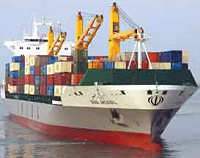 Yesterday the Treasury Department’s Office of Foreign Assets Control (“OFAC”) added the Islamic Republic of Iran Shipping Lines (“IRISL”) and its related companies to the Specially Designated Nationals and Blocked Persons (“SDN”) list. As part of this designation, 123 vessels believed to be operated by IRISL were added to the SDN list. As a result of these designations, U.S. persons are forbidden to engage in any transactions with IRISL, it’s related entities or the designated vessels. Freight forwarders and shippers are now forbidden to ship any cargo — including licensed cargo — on the 123 designated vessels. Furthermore any property of the IRISL that comes under the control of a U.S. person must be blocked.
Yesterday the Treasury Department’s Office of Foreign Assets Control (“OFAC”) added the Islamic Republic of Iran Shipping Lines (“IRISL”) and its related companies to the Specially Designated Nationals and Blocked Persons (“SDN”) list. As part of this designation, 123 vessels believed to be operated by IRISL were added to the SDN list. As a result of these designations, U.S. persons are forbidden to engage in any transactions with IRISL, it’s related entities or the designated vessels. Freight forwarders and shippers are now forbidden to ship any cargo — including licensed cargo — on the 123 designated vessels. Furthermore any property of the IRISL that comes under the control of a U.S. person must be blocked.
Simultaneously with the designation Adam Szubin, Director of OFAC, and several State Department officials held a press briefing on the new designations. Szubin explained that the designation was based on IRISL’s shipment of proliferation materials. He also did a little jaw-boning:
And when that is combined with the demonstrated pattern of deceptive practices, where IRISL has misled maritime authorities and other companies about the nature of the goods it’s shipping, it leads one to a very difficult question, if one is considering doing business with IRISL consistent with international requirements.
So to the question you ask, every company and insurance company will have to ascertain for itself whether it is comfortable that the cargos and the shipments that it is insuring are consistent with international requirements not to assist Iran’s proliferation program. I don’t know how easily they can reach a state of comfort with that. If they can, then they ought to proceed. But I think it’s presenting, at the very least, a very risky proposition.
What’s going on here is that an insurer of a shipment transiting on IRISL isn’t dealing directly with IRISL and thus isn’t strictly prohibited from insuring the shipment, so Szubin is trying to jaw-bone insurers into not insuring the shipments.
What about banks that issue letters of credit covering shipments carried by IRISL? Like insurers, the banks may not be dealing directly with IRISL. Here the situation is somewhat more complicated. The designation order instructs banks to reject (but not block) any funds transfer referencing a designated vessel. Moreover,
Banks must contact OFAC’s Compliance Programs Division for further instructions should the name of an SDN vessel appear in shipping documents presented under a letter of credit or if noticed in a documentary collection.
Presumably the concern here is that part of the payment under the letter of credit may be used to pay freight charges to IRISL and thus involve prohibited direct dealings with IRISL.
One problem with any vessel designation is that names and flags of the vessel can be easily changed. In the press briefing Szubin attempted to address this problem by noting the vessel information contained in the designation:
Something that I haven’t mentioned yet today, but Treasury has also made available on its website, through its specially designated nationals list, a list of 123 IRISL vessels with special identifier numbers, the flags of registry, all the information that we have, including tonnage, so as to facilitate those around the world identifying whether an IRISL ship and IRISL is involved in a given shipment. … That is the – that is the full list of vessels that we’ve been able to identify with certainty and with the types of identifiers — I was mentioning earlier the tonnage that – the unique identifying number that belongs to a ship even if it changes its name, and that’s a key point when it comes to IRISL.
Director Szubin seems to be somewhat confused and to be suggesting that the vessels net weight is a unique identifying number that should checked for each vessel. In fact, he should — and probably intended to — reference the IMO number, a unique number assigned to each vessel by the International Maritime Organization and which survives name and flag changes. Accordingly, no freight forwarder or shipper should use a vessel without obtaining the vessel’s IMO and checking that number on the SDN list.

 Posted by
Posted by  Category:
Category: 

 A federal grand jury in the District of Columbia indicted an Indian national, Siddabasappa Suresh, and an Indian company,
A federal grand jury in the District of Columbia indicted an Indian national, Siddabasappa Suresh, and an Indian company, 
 Another freight forwarder pays for the sins of its customers.
Another freight forwarder pays for the sins of its customers.  Last week the Office of Foreign Assets Control (“OFAC”) released its
Last week the Office of Foreign Assets Control (“OFAC”) released its 

